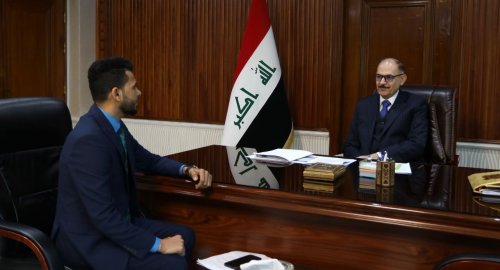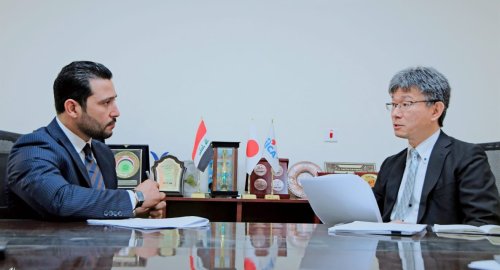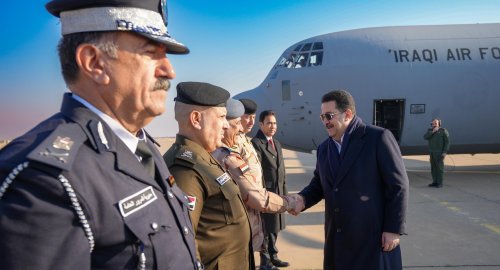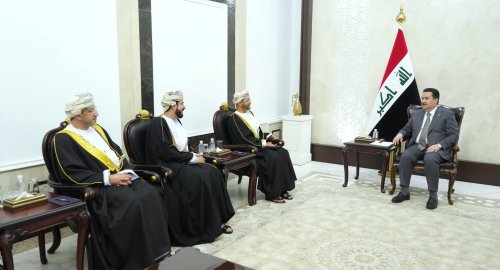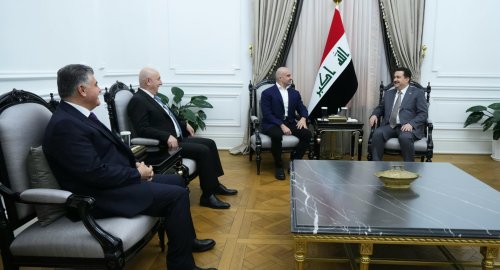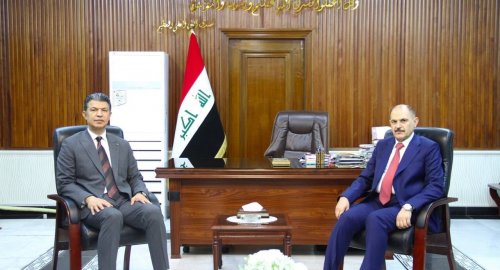
Hammadi and Al-Amiri discuss mechanisms of joint cooperation

- 7-04-2024, 21:18
Baghdad-INA
The head of the Iraqi Media Network, Karim Hammadi, discussed today, Sunday, with the President of the Federal Supreme Court, Judge Jassim Al-Amiri, mechanisms for joint cooperation in various fields.
This came during a visit conducted by the head of the Iraqi Media Network, Karim Hammadi, to the President of the Federal Supreme Court, Judge Jassem Al-Amiri, and they discussed mechanisms for joint cooperation.
During the meeting, Hammadi stressed the role played by the Iraqi Media Network in supporting the political system, enhancing public confidence in it, and highlighting various service projects.
Hammadi pointed out the existence of a new program course that focuses on educating citizens about the dangers and consequences of financial and administrative corruption, as well as drugs, in addition to enhancing the role of citizens in supporting government efforts in providing services.
He stressed that "the Iraqi Media Network, represented by all its institutions, provides all media support to the judicial institutions and the Federal Supreme Court, and the pivotal role they play in consolidating the application of the provisions of the Constitution and defending the rights of the people."
In turn, the President of the Federal Supreme Court, Judge Jassim Al-Amiri, welcomed the visit of the head of the Iraqi Media Network, Karim Hammadi, offering congratulations on his assumption of the position of managing the Iraqi Media network.
Judge Al-Amiri pointed to "the pivotal role played by the Iraqi Media Network, with all its components, in supporting the needs of citizens and addressing the needs of education and awareness, in addition to confronting the smear campaigns carried out by some media outlets."
Al-Amiri stated that “The judiciary is distinguished under the Constitution by its complete independence from the legislative and executive authorities, and this independence under Articles 89, 87 and 88 of the Constitution is institutional independence and individual independence,” pointing out that “institutional independence is the independence of the judiciary from the legislative and executive authorities, while individual independence is the independence of judges in their work from any external influence.”
"The Iraqi Constitution effective in 2005 represented a birth in which the suffering of the Iraqi people was embodied in a past in which an individual dictatorial regime controlled the reins of power and violated the values, principles and blood of the Iraqi people, while in its present it represents the sacrifice made by the people in their fight against terrorist gangs represented by Al-Qaeda and ISIS." Al-Amiri said.
PM Al-Sudani arrives in Nineveh
- politics
- 10:17
China Says It 'Firmly Opposes' US Military Aid To Taiwan
- International
- 07:36
First joint picture of Greenland Ice Sheet melting, ESA
- Multimedia
- 09:28
US Central Command: We killed ISIS terrorist leader Abu Yusuf in Syria
- International
- 24/12/20
Liverpool compete with Real Madrid to sign Olympique Lyonnais star
- Security
- 24/12/19
ISC, ADX discuss Strengthening Economic Ties
- Economy
- 24/12/16
Iraq assumes presidency of Arab Investment Company’s Executive Board
- Economy
- 24/12/17
